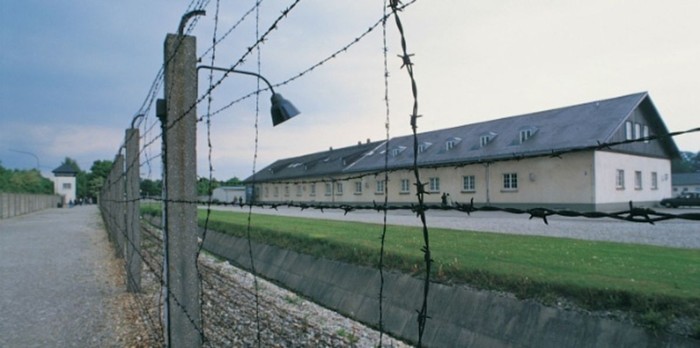
I pushed open the massive iron gate, pausing to read the German words “Arbeit macht frei” (“Work makes free”). Although I’d read those infamous words in World War II books, I couldn’t believe I was actually here, walking into a former concentration camp.
Dachau had a distinct odor. Maybe it’s the smell of death, I thought. I mean, over 30,000 people died here!
Walking into one of the sixty-nine barracks, I imagined the many narrow wooden bunks, which were crammed in from floor to ceiling, filled with emaciated prisoners. I passed into the lavatory, where rows and rows of toilets were lined up side by side. No doors; no privacy.
Could you even imagine living in these conditions?
Hidden in the corner of the camp was the crematorium. I stood in the rooms where prisoners were ordered to remove all their clothes, where they took “showers.”
What would it have been like to stand here, knowing I was about to be poisoned by deadly gas? I couldn’t even imagine the experience.
Exiting the gas chambers, I saw the crematorium ovens. I knew the history, but being there made it all too real. Tears rolled down my cheeks as I stood there—frozen in sadness.
Although this camp was liberated over seventy years ago, a cloud of sorrow still hung over the camp. As I made my way back to the entrance, a large memorial sign in front of the main building caught my eye: “Never again.”
I just stared at the words and silently agreed. We must remember this atrocity and NEVER let it happen again.
----
What a horrible place! A country might understandably prefer to destroy these concentration camps and forget the atrocity altogether. Instead, Germany has made memorials of these sites, and every elementary school child has to visit them as part of their education. Why? So they won’t forget, so they won’t repeat the mistakes of a previous generation.
Germans recognize that history repeats, and they are doing their best to keep their students—and the world—accountable. If a story isn’t retold and remembered, we humans tend to rewrite it, committing the same errors.
Memorials are important, not only in history, but in our personal lives as well. They help us remember our past—both the good and the bad—and remind us of the lessons we learned. As Christians, we need to build memorials to keep from repeating sins and to remember God’s deliverance.
“Faith keeps the soul from sinking under heavy trials, by bringing in former experiences of the power, mercy, and faithfulness of God to the afflicted soul” (John Wilson).
When something big happens in your life, don’t forget what you learned from it. Sometimes we need to forgive and forget certain details, but we must never forget the lessons we learned.
Similarly, it’s wise to recall our past relationships. Whether we had a positive or negative experience, reflecting on what we’ve learned helps us become wiser people.
This isn’t necessarily easy. I know I’d sometimes rather forget the mistakes I’ve made in my relationships. And I’d also rather forget the times I was wronged by a significant other. But I need to look back, not in bitterness, but in genuine interest. Where was I wrong? Where was he wrong? How can I learn from my mistakes? And what safe guards can I put in place to avoid such negative relationships in the future?
A bad relationship is bad enough. But learning nothing from it is even worse! Then you’re sure to repeat it all over again.
Achieving the right combination of remembering and forgetting is a tricky balancing act. You must remember to make better choices in the future, but you cannot allow bad memories to take over your life and define your future. For example, does the average German historian go into a depression whenever he thinks of the Holocaust? Doubtful. Rather, he must say something like, “Wow. We really messed up. Let’s remember this tragic event in our history so we won’t do it again. Then we can move forward in pursuit of peace.”
Similarly, we need reminders of our past relationship mistakes; otherwise we can get into a cycle of bad relationships, moving from one emotionally abusive relationship to another.
So, don’t be afraid of your past. Don’t be defined by your past. Don’t be bitter about your past. But please DON’T completely forget your past. Learn from it. Learn and make better choices in your next relationship.









